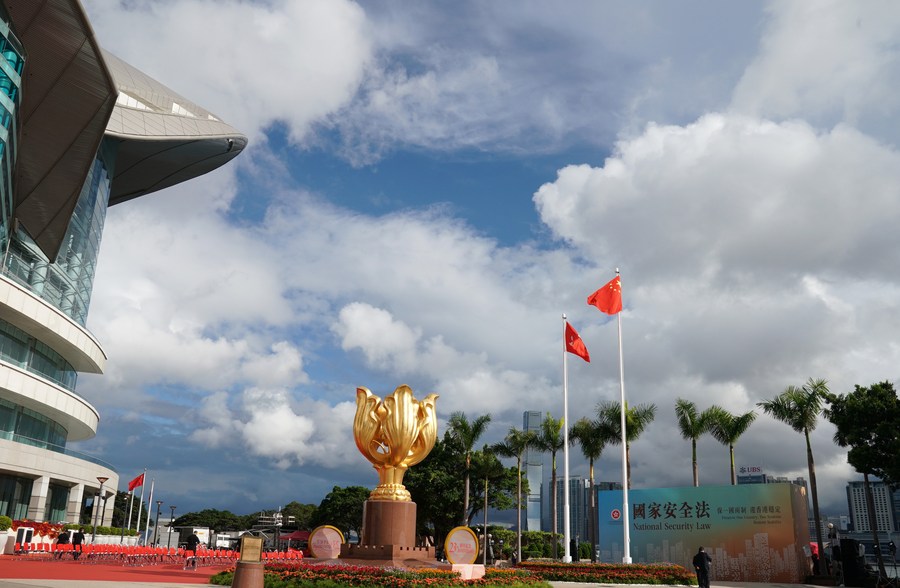HK should leverage three mega trends for its future
By Regina Ip | China Daily Global | Updated: 2024-07-31 09:19

Hong Kong Chief Executive John Lee Ka-chiu has pulled off many significant achievements in his first two years in office. A historic milestone was reached with the enactment of local legislation to implement Article 23 of the Basic Law.
Much progress has been made in battling Hong Kong's public housing crisis. A total of 4,400 light public housing units are scheduled to be available early next year for inhabitants of unsafe subdivided cubicles. The waiting time for public housing applicants is forecast to go down to 4.5 years in 2026-27. Relaxation of immigration policies has enabled around 120,000 professionals and other workers to replenish Hong Kong's workforce. The economy is on a steady recovery path. Visitor arrivals in the first half of this year, at 21 million, represent a 64 percent increase compared with the same period last year. Initial public offerings of blockbuster stocks have slowed, but the Hong Kong Special Administrative Region continues to excel in wealth management, financial innovations and functioning as the largest offshore renminbi pool.
There is much to celebrate.
Yet, as Zheng Yanxiong, director of the Liaison Office of the Central People's Government in the HKSAR, pointed out in his speeches on the special administrative region's 27th anniversary, change is sweeping across the globe, and Hong Kong needs to work out a way to deal with the twin challenges of change and continuity. "Change is a constant. The change occurring in the global order unseen in 100 years is accelerating. Hong Kong should seize the initiative to create new opportunities," Zheng urged. The central government's commitment to upholding "one country, two systems" is unwavering, but the special administrative region needs to push ahead with reforms to keep abreast of change. Similar sentiments were expressed by Xia Baolong, director of the Hong Kong and Macao Work Office of the Communist Party of China Central Committee, in his speech delivered on National Security Education Day on April 15.
Three mega trends that are unfolding will have a decisive impact on Hong Kong's future. They are occurring in the following areas — Hong Kong's accelerating integration with the Chinese mainland, technological breakthroughs in artificial intelligence, and the reshaping of the world order consequent on the rise of China.
On Hong Kong's integration with the mainland, the trend is irreversible and it will have a major impact on Hong Kong's population makeup, the character of its society and the shape of its future economy. This is evidenced by statistics showing Hong Kong residents continuing to visit mainland cities in the Guangdong-Hong Kong-Macao Greater Bay Area in large numbers. They are going farther and farther north, and with policy adjustments being made by governments on both sides of the boundary to make it easier for Hong Kong residents to visit and work there, more and more Hong Kong residents will likely choose to settle on the mainland.
Such an outflow of people and consumption dollars will cause short-term disruption to the local economy, but the Hong Kong government is in the process of tapping into the mainland for talent, in particular technological talent, to help the city jump-start its technological parks. As a latecomer in going after quantum computing, AI and microelectronics, the holy grail of all would-be tech hubs, Hong Kong welcomes the engineers and tech talent from the mainland to fill the advanced manufacturing facilities, the labs and data centers being planned. Longer term, the influx of such talent will have a transformative impact on Hong Kong's population and economic structure.
Last March, Sam Altman, the founder of OpenAI, transfixed the world with the generative ability of his ChatGPT-4. In a race to emulate each other, scientists are building smart computers, some of which are displaying capabilities exceeding those of humans. More and more AI tools are being used to do work hitherto undertaken by humans. Some AI tools have partnered with humans as co-pilots, while some have shown humanlike biases and resistance to control. AI will bring sweeping changes to the workplace. The expectation is that AI advancement will create new jobs and open up new frontiers of knowledge, but before that happens, many jobs may be cut. The world will soon be consumed with the wonders wrought by AI as well as issues related to AI governance.
Finally, the United States-led "liberal" international order, which has dominated the world since World War II, is showing increasing signs of cracks and fracturing into different geopolitical blocs. The crisis in Ukraine has shattered Europe's semblance of political stability. It abruptly ended Germany's warming ties with Russia because of the former's dependence on Russian gas and turned Russia into a pariah in Western eyes.
The US' "China threat" fallacy and the consequent adoption of a de facto "decoupling" policy toward China have accelerated China's drive toward self-reliance, the formation of its own circle of friends, and the expansion of the BRICS group to include more emerging and nonaligned countries.
Against this backdrop of a shifting world order, Hong Kong must strive hard to maintain and expand its international space so that its external trade and economic relations can continue to flourish. Given its unique position sandwiched between the Chinese mainland and the West, Hong Kong should make greater use of its value as a channel for communication across different cultural and political frontiers, and help the country ease tensions and win more friends.
These mega trends pose challenges that Chief Executive John Lee would do well to take on in the next few years to ensure Hong Kong's long-term success.
The author is convener of the Executive Council of the Hong Kong Special Administrative Region and a legislator.
























